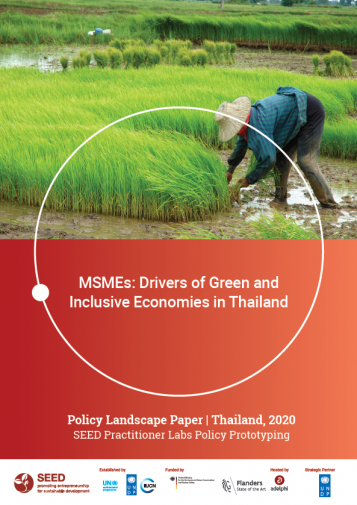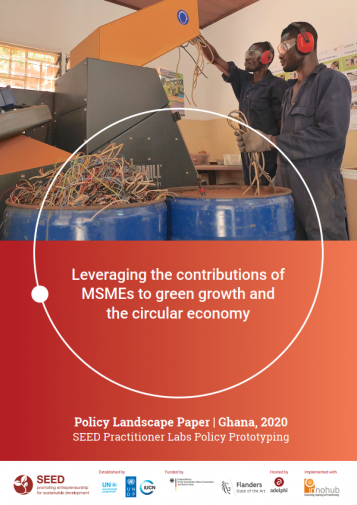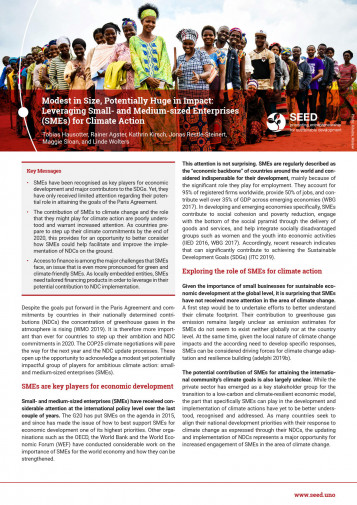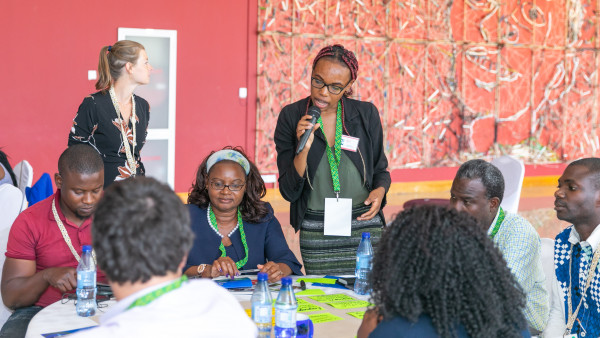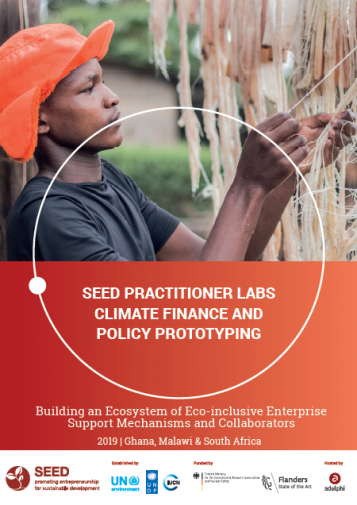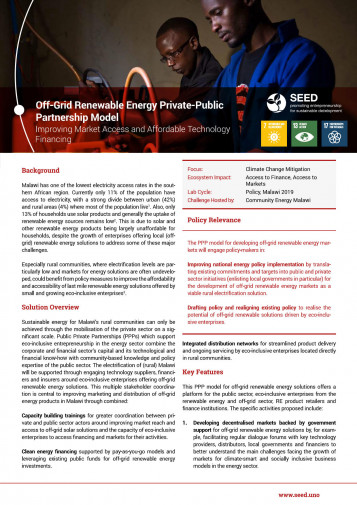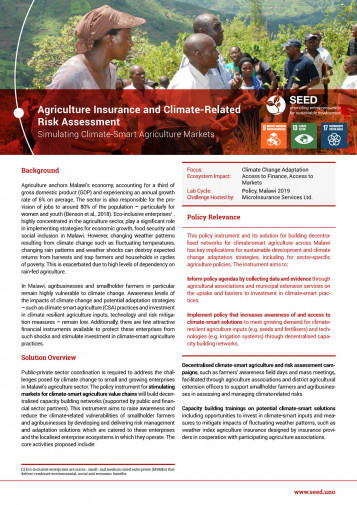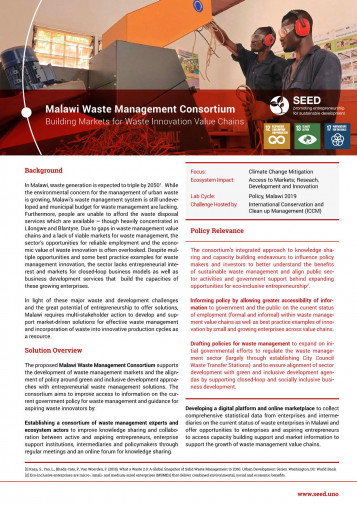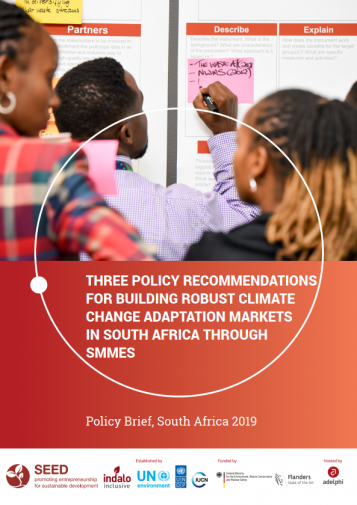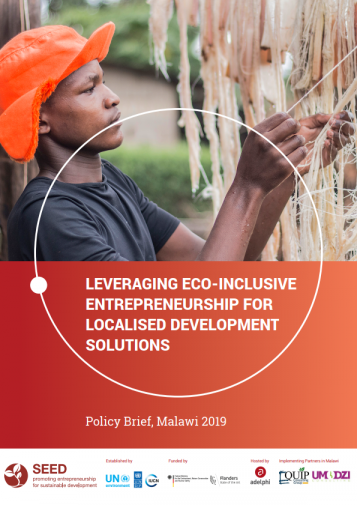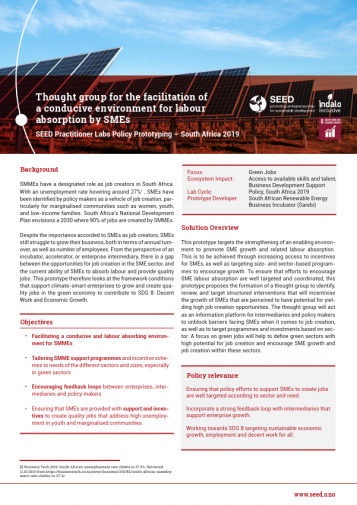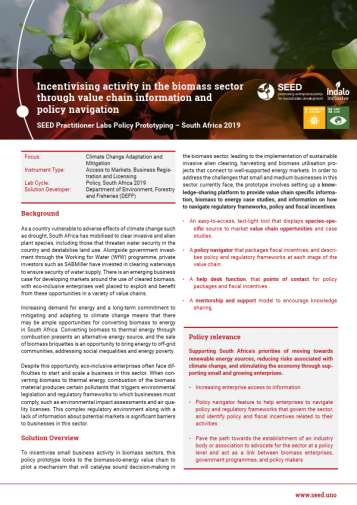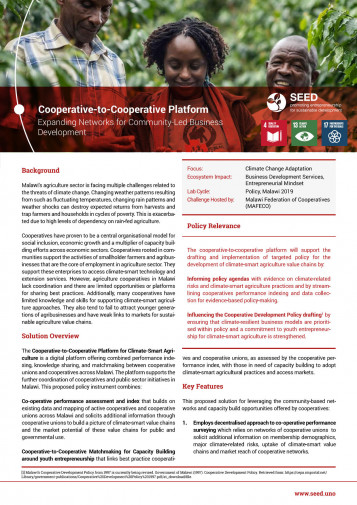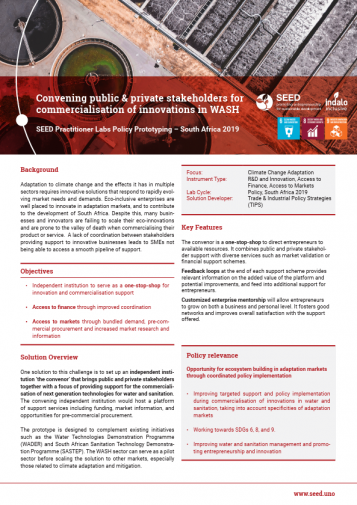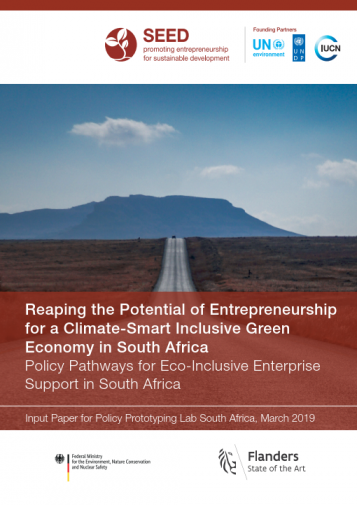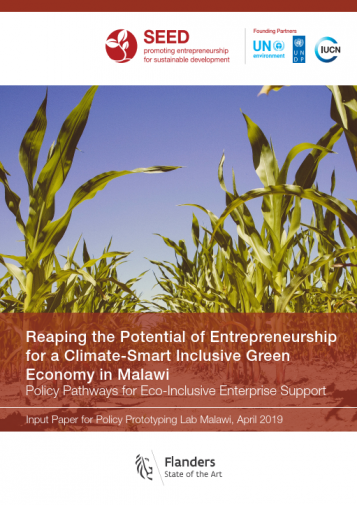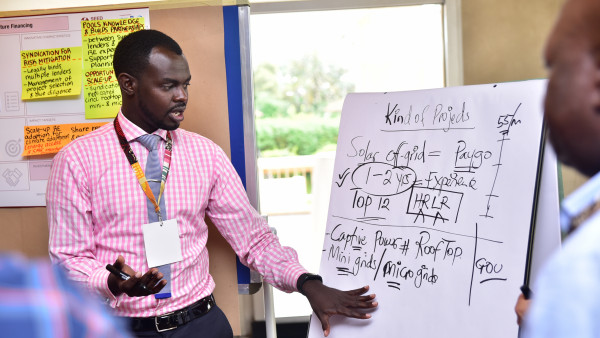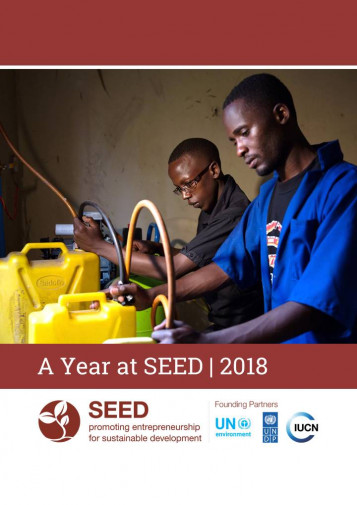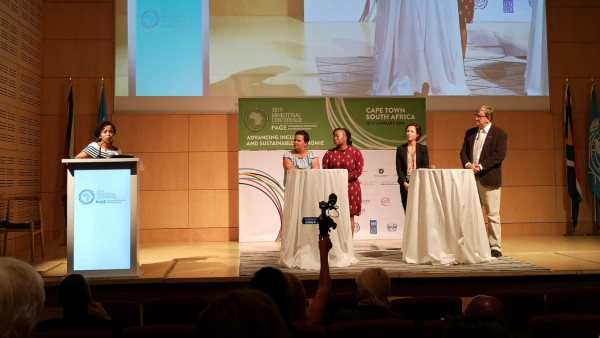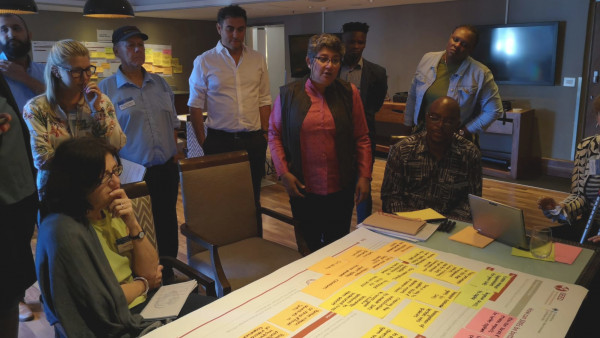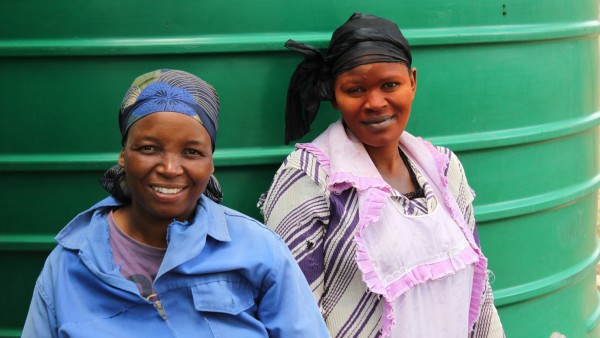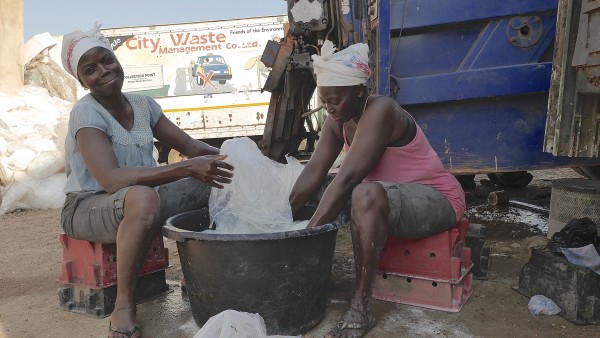Supporting MSMEs for Ghana’s transition to a Circular Economy: Solutions from SEED’s Policy Lab
Published: 09 December 2020 Amanda Panella, Camilla Shearman
While eco-inclusive enterprises drive the transition to a circular economy, they often face significant constraints to build and scale their businesses. Mr. Boachie highlighted that eco-inclusive MSMEs often face specific challenges based on perceived higher-than-normal risks, and a unique need for longer-term financing. Read more
MSMEs: Drivers of Green and Inclusive Economies in Thailand | Policy Landscape Paper, Thailand
Published: 01 September 2020 Linde Wolters, Panramon Mahasuwan, Sonya Ong, Supapim Wannopas
As a leader in the ASEAN region, Thailand’s policy frameworks are well aligned with ASEAN initiatives, UN Sustainable Development Goals (SDGs) and Paris Agreement. Various stakeholders including those in the MSME ecosystem are working towards achieving the Thailand 4.0 industrial policy, a long-term vision to transition the country into an innovation-based economy, with a focus on technology, creativity and services. This policy landscape paper provides a brief overview of the social and environmental impact entrepreneurial ecosystem in Thailand. It serves as the background for the Practitioner Labs for Policy Prototyping hosted by SEED with UNDP Thailand as strategic partner. Read more
SDGs:







Leveraging the contributions of MSMEs to green growth and the circular economy in Ghana | Policy Landscape Paper
Published: 01 September 2020 Camilla Shearman, Doris Awortwi-Tandoh, Julia Haack, Kodjo Barnor, Letitia Varney, Linde Wolters, Thomas Wiredu
The policy context as it relates to MSMEs in Ghana is in a state of transformation. With a new MSME Policy on the horizon that seeks to align and coordinate efforts to support this stakeholder group, it is an opportune moment to look at the social and environmental contributions of MSMEs to Ghana’s development priorities, and how policy solutions can leverage these contributions. Furthermore, as MSME activities in specific sectors – for example in the waste management sector – receive increasing attention, there is opportunity for a coordinated effort to address challenges.
By bringing together different perspectives and experiences, the SEED Practitioner Labs for Policy Prototyping provides an opportunity to build partnerships and holistic solutions. Read more
By bringing together different perspectives and experiences, the SEED Practitioner Labs for Policy Prototyping provides an opportunity to build partnerships and holistic solutions. Read more
SDGs:





UN High-Level Political Forum 2020 - Eco-Inclusive Enterprises and COVID-19
Published: 05 August 2020
As momentum builds for post-pandemic recovery, eco-inclusive enterprises around the world offer inspiring examples of inspiring solutions. Learn about their response and vision for a green recovery with Frontier Markets (India), Farmerline (Ghana), Amazóniko (Colombia), Gorilla Conservation Coffee (Uganda), Kibébé (Malawi) and EcoPlastile (Uganda). Read more
Modest in Size, Potentially Huge in Impact: Leveraging Small- and Medium-sized Enterprises (SMEs) for Climate Action
Published: 23 December 2019 Jonas Restle-Steinert, Kathrin Kirsch, Linde Wolters, Maggie Sloan, Rainer Agster, Tobias Hausotter
Despite the goals put forward in the Paris Agreement and commitments by countries in their nationally determined contributions (NDCs) the concentration of greenhouse gases in the atmosphere is rising (WMO 2019). It is, therefore, more important than ever for countries to step up their ambition and NDC commitments in 2020. The COP25 climate negotiations will pave the way for the next year and the NDC update processes. These open up the opportunity to acknowledge a modest yet potentially impactful group of players for ambitious climate action: small- and medium-sized enterprises (SMEs). Read more
SDGs:







Bringing SME voices into policy solution development through our Practitioner Labs for Policy Prototyping
Published: 16 December 2019 Camilla Shearman
In late October, seven policy practitioners took to the stage during the SEED Practitioner Labs for Policy Prototyping scale-up labs in South Africa and Malawi. The practitioners shared their ideas of policy solutions to leverage the potential of eco-inclusive enterprises in driving the transition to green and inclusive economies. Read more
SDGs:















SEED Practitioner Labs 2019
Published: 25 November 2019 Alina Weiss, Camilla Shearman, Julia Haack, Kathrin Kirsch, Maggie Sloan, Marlena Kiefl
This brochure gives an overview of the 16 climate finance solutions and policy instruments developed during the 2019 SEED Practitioner Labs Climate Finance and Policy Prototyping in Ghana, Malawi, and South Africa.
This year, the labs brought together over 320 policy makers, financial institutions, civil society, research organisations, intermediaries and eco-inclusive enterprises to co-create solutions to financial and policy barriers facing eco-inclusive enterprises as they look to start and scale their ideas. Read more
This year, the labs brought together over 320 policy makers, financial institutions, civil society, research organisations, intermediaries and eco-inclusive enterprises to co-create solutions to financial and policy barriers facing eco-inclusive enterprises as they look to start and scale their ideas. Read more
SDGs:



Off-grid renewable energy private-public partnership model: Improving market access and affordable technology financing | Policy, Malawi 2019
Published: 13 November 2019 Alina Weiss, Maggie Sloan, Marlena Kiefl
his private-public partnership model furthers the electrification of (rural) Malawi by engaging technology suppliers, financiers and government around eco-inclusive enterprises offering off-grid renewable energy solutions and delivering capacity building for integrated distribution networks and targeted clean energy financing solutions. Read more
SDGs:





Agriculture Insurance and Climate-Related Risk Assessment: Stimulating Climate-Smart Agriculture Markets | Policy, Malawi 2019
Published: 13 November 2019 Alina Weiss, Maggie Sloan, Marlena Kiefl
The policy instrument for stimulating markets for climate-smart agriculture value chains, combining agriculture insurance and climate-related risk assessment, will build decentralised capacity-building networks (supported by public and financial sector partners). This instrument aims to raise awareness and reduce the climate-related vulnerabilities of smallholder farmers and agribusinesses by developing and delivering risk management and adaptation solutions which are catered to these enterprises and the localised enterprise ecosystems in which they operate. Read more
SDGs:





Malawi Waste Management Consortium: Building markets for waste innovation value chains | Policy, Malawi 2019
Published: 13 November 2019 Alina Weiss, Maggie Sloan, Marlena Kiefl
The Malawi Waste Management Consortium supports the development of waste management markets and the alignment of policy around green and inclusive development approaches with entrepreneurial waste management solutions. The consortium aims to improve access to information on the current government policy for waste management and guidance for aspiring waste innovators by establishing a consortium of waste management experts and ecosystem actors and developing a digital platform and online marketplace for waste innovation. Read more
SDGs:





Three policy recommendations for building robust climate change adaptation markets in South Africa
Published: 28 October 2019 Camilla Shearman, Christine Meyer, Sonya Ong
With lessons drawn from an 8-month policy prototyping labs cycle in South Africa and over fifteen years of enterprise support, this policy brief presents three recommendations for policymakers to improve SMME access and contribution to climate change adaptation markets. These recommendations include (1) increasing availability of and access to market information, (2) creating support pipelines between public and private stakeholders, and (3) leveraging intermediaries as key contributors to the implementation and evaluation of market access policies. Read more
SDGs:







Leveraging eco-inclusive entrepreneurship for localised development solutions | Policy Brief Malawi
Published: 21 October 2019 Camilla Shearman, Christine Meyer, Maggie Sloan, Marlena Kiefl
In a global context of commitments to sustainable development and the mitigation of and adaptation to climate change, Malawi has set out ambitious agendas to increase resilience to climate change and move towards a green and inclusive economy. Translating these ambitious agendas into impact at the community level requires concerted efforts in the decentralisation of policy initiatives and capacity building of local actors. SMMEs play a key role in aligning local markets to national development goals, and can have a transformational impact on the achievement of these goals. Drawing on discussions from the SEED policy dialogue and labs process in Malawi, this policy brief presents recommendations to policy makers for leveraging the potential of SMMEs to transform the agriculture, waste, and clean energy sectors in Malawi, and across Southern Africa. Read more
SDGs:



Building a conducive environment for SME labour absorption | Policy, South Africa 2019
Published: 21 October 2019 Camilla Shearman, Julia Haack
This policy instrument targets the strengthening of an enabling environment to promote SME growth and related labour absorption. This is to be achieved through increasing access to incentives for SMEs, as well as targeting size- and sector-based programmes to encourage growth. The thought group will act as an information platform for intermediaries and policy makers to unblock barriers facing SMEs when it comes to job creation, as well as to target programmes and investments based on sector. A focus on green jobs will help to define green sectors with high potential for job creation and encourage SME growth and job creation within these sectors . Read more
SDGs:

Incentivising activity in the biomass sector | Policy, South Africa 2019
Published: 21 October 2019 Camilla Shearman, Julia Haack
This policy prototype looks to the biomass-to-energy value chain to pilot a mechanism that will catalyse sound decision-making in the biomass sector, leading to the implementation of sustainable invasive alien clearing, harvesting and biomass utilisation projects that connect to well-supported energy markets. In order to address the challenges that small and medium businesses in this sector currently face, the prototype involves setting up a knowledge-sharing platform to provide value chain specific information, biomass to energy case studies, and information on how to navigate regulatory frameworks, policy and fiscal incentives. Read more
SDGs:





Cooperative-to-Cooperative Platform: Expanding networks for community-led business development | Policy, Malawi 2019
Published: 21 October 2019 Alina Weiss, Maggie Sloan, Marlena Kiefl
The cooperative-to-cooperative platform for climate-smart agriculture is a digital platform offering combined performance indexing, knowledge sharing, and matchmaking between cooperative unions and cooperatives across Malawi. The platform supports the further coordination of cooperatives and public sector initiatives in Malawi. Read more
SDGs:





Commercialisation of climate change adaptation innovations | Policy, South Africa 2019
Published: 21 October 2019 Camilla Shearman, Julia Haack
The proposed independent institution brings public and private stakeholders together with a focus of providing support for the commercialisation of climate change adaptation technologies. The convening independent institution would host a platform of support services including funding, market information, and opportunities for pre-commercial procurement. The solution will therefore act as a “one stop shop” for SMEs during commercialisation. Read more
SDGs:





Designing policy instruments to benefit green and social enterprises in Southern Africa
Published: 07 June 2019 Camilla Shearman
Last month we launched our SEED Policy Prototyping Programme, a series of Policy Labs in South Africa and Malawi. Bringing together policymakers and enterprise support organisations, we explored the policy challenges facing local social & green enterprises. Using hands-on SEED 'prototyping' tools, we then develop the first concrete solutions to these challenges. Read more
SDGs:

Policy pathways for eco-inclusive enterprise support in South Africa | Policy Landscape Paper
Published: 01 April 2019 Camilla Shearman, Christine Meyer, Maggie Sloan
The transition to a green, inclusive, and climate-smart South Africa requires collaborative efforts from the public sector, civil society, and private sector. As small and growing enterprises are an essential driver of growth, particularly in emerging economies, cross-sector partnerships to co-create an enabling environment for enterprises with inclusive and climate-smart business models are critical.
This policy landscape paper provides a snapshot of the ecosystem in which eco-inclusive, climate-smart small and growing enterprises operate. By identifying areas where further support is needed, this paper is connected to the SEED Policy Prototyping Programme, in which stakeholders across sectors collaborate to co-create policy instruments designed to build a more enabling ecosystem for eco-inclusive entrepreneurs. Read more
This policy landscape paper provides a snapshot of the ecosystem in which eco-inclusive, climate-smart small and growing enterprises operate. By identifying areas where further support is needed, this paper is connected to the SEED Policy Prototyping Programme, in which stakeholders across sectors collaborate to co-create policy instruments designed to build a more enabling ecosystem for eco-inclusive entrepreneurs. Read more
SDGs:



Policy pathways for eco-inclusive enterprise support in Malawi | Policy Landscape Paper
Published: 01 April 2019 Benita Rose, Christine Meyer
The transition to a green, inclusive, and climate-smart Malawi requires collaborative efforts from the public sector, civil society, and the private sector. Micro, small and medium-sized enterprises (MSMEs) are important drivers of growth in Malawi, particularly in emerging economies, andmaking cross-sector partnerships are critical to co-creatinge an enabling environment for enterprises with inclusive and climate-smart business models.
This input paper provides a snapshot of the ecosystem in which eco-inclusive small and growing enterprises operate. By identifying areas where further support is needed, this paper serves as an input to the SEED Policy Prototyping Programme, in which stakeholders across sectors collaborate to co-create policy instruments designed to build a more enabling ecosystem for eco-inclusive entrepreneurs. Read more
This input paper provides a snapshot of the ecosystem in which eco-inclusive small and growing enterprises operate. By identifying areas where further support is needed, this paper serves as an input to the SEED Policy Prototyping Programme, in which stakeholders across sectors collaborate to co-create policy instruments designed to build a more enabling ecosystem for eco-inclusive entrepreneurs. Read more
SDGs:









Kick-Off Lab | SEED Practitioner Labs Policy Prototyping
Published: 19 February 2019
The SEED Practitioner Labs Policy Prototyping programme in Malawi will include three hands-on and highly collaborative Practitioner Labs, beginning with the Kick-Off Lab on 09-10 April 2019 in Lilongwe. Read more
SDGs:













A Year at SEED | 2018
Published: 31 January 2019
Our annual visual report (A Year at SEED | 2018) celebrates achievements across both our Direct Enterprise Support and Ecosystem Building programmes plus shares our involvement in key high-level dialogues and milestones in organisational development, while introducing you to this year's SEED Low Carbon Award Winners who offer innovative solutions for climate change adaptation and mitigation. Read more
SDGs:





















SEED-supported enterprises applauded as green economy innovators at PAGE
Published: 15 January 2019
The 2019 PAGE Ministerial Conference drew attention to "Advancing Inclusive and Sustainable Economies" on 10 and 11 January 2019. By participating in the conference in Cape Town, South Africa, SEED highlighted the importance of supporting small and medium sized enterprises (SMEs) to realising and strengthening inclusive and green economies. Read more
SDGs:













Eco-inclusive enterprises get a stake in green economy agendas during GEC discussions
Published: 14 January 2019
SEED backed smaller eco-inclusive enterprises to #GetAStake in the Green Economy transition during action-oriented discussions at the Green Economy Coalition Global Meeting 2019. Read more
SDGs:











Supporting pioneering community businesses on their pathway towards a sustainable future
Published: 25 July 2018 Christine Meyer, Insa Jülich
Dakeni is a small, very rural village near Eshowe, KwaZulu-Natal - around 300 people live in the village. Arriving in the area, we see local women taking care of a large plant nursery. A lot of the men are working in the distant cities. Read more
SDGs:





Seizing opportunities of eco-inclusive enterprises for a green and inclusive waste sector in South Africa
Published: 25 July 2018 Christine Meyer, Insa Jülich
Do you recycle? – Good. But do you know what happens to your waste when it has been collected? Read more
SDGs:









